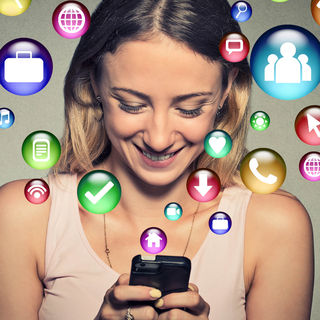Media
The Pressures of Social Media: Should I Disconnect?
The best solution for social media anxiety is social media mindfulness
Posted July 19, 2016
The rapid adoption of social media platforms and smartphones has created an always-on environment. It has revived discussions about information overload and raised basic questions about how social media is impacting our lives. A better approach is to figure out how you want to live and then see how all this Internet-enabled connectivity fits in your picture. Start by cultivating Social Media Mindfulness—keep a journal for a few days noting when you use social media, why, and how it makes you feel.
What are the biggest positives and negatives of social media?
On the positive side, social media empowers people to have a voice, the create content, and to access and connect with people and information ways they couldn’t before. On the negative: social media is very powerful. Like most powerful tools, it can be used badly. We have to understand social media, how it works, it’s allure and the shortcomings so that we can make intelligent and safe choices. Using it well demands that we 1) understand the risks, 2) take more responsibility for our online behavior and 3) develop self-regulation so that our behavior supports our goals.
What’s behind the trend of people talking about giving up all their social media accounts?

It’s sometimes an appealing image—just checking out from the 24/7 demands of social technologies. Going off the grid and eschewing society at large is not a new concept. In a globally-networked world, deleting all your social media accounts is a way to avoid the “pressure.” It also avoids the necessity of developing the self-control and self-regulation necessary to use this powerful tool to your best advantage. For people who feel they can’t resist the temptations of social platforms and the Internet (which trigger instinctive motivations of curiosity, social connection and social comparison), then unplugging is like never being around the things you feel you can’t control. The question is—what are you giving up? The choice doesn’t make sense unless you first establish your goals and priorities—the same things that are necessary as the first step in self-regulation.
Is it possible to go without social media today?
Anyone who “quits social media” would have to make the decision as to where to draw the line with technology. Does quitting everything include the telephone? Games? Email necessary for work? Or are you just talking about Facebook? The key is figuring out what is working for you, what isn’t and designing your use around that. If you are wasting too much time using Facebook or Twitter, limit your use or quit that platform.
There will always be some people who gravitate to extremes, both with and without social media. The net impact of social technologies, however, has been very positive across a number of domains because of access to information and productivity. Recognize that whatever you do, it is a question of you making choices, not the mysterious power of social media.
Will going “off the grid” and giving up social media become a trend?
Social media satisfies too many key psychological needs and provides too many economic and social benefits to make it common for people to choose to go off the grid. As social media becomes more “normal” and less “shiny penny,” people will have the experience to be more thoughtful about what they use and when and how they use it. It is normal to experiment with new and popular things to better understand what they do—that’s how we figure out how to use them. People are just getting to that point of reflection, which is driving a lot of the talk about social media breaks and total withdrawal. Withdrawing is easier than figuring out a solution where some use works for you, but it has costs.
Is there a certain type of person or personality who/that should avoid social media?
People who have low self-esteem, poor impulse control or a tendency toward addiction should pay attention to their social media use—but social media use is only one of many places problematic behaviors will manifest. Contrary to many peoples’ fears, social media does not make someone more socially avoidant or isolated. In fact, it can do the opposite by providing access to people and resources. People who have problems with social media--whether it's severe FOMO (fear of missing out), negative social comparison, need for validation or overuse--will have similar issues in other aspects of their life. Rather than avoid social media, it is more effective to identify behavioral problems and learn skills to address and manage them, such as goal setting, self-regulation, and self-control. Those skills are key life skills, transferable to other domains and tend to be the critical determinants of life success—professionally and personally. Positive social media use may, in fact, be an indicator of future success given the need for self-control and goal-setting implied in controlling it.
How can we build healthy relationships with social media?
Yes! It’s all about finding balance. A healthy relationship with social media means approaching technology like we do other things we want to control and make work for us: we pay attention to what we do and why. Call it ‘Social Media Mindfulness.’ By thinking about our goals, we can evaluate how our behavior is supporting or hindering them, the same way we would with, for example, diet and fitness plans. Keeping a social media diary, like a food journal or exercise log, and noting when and why you use technology and your emotions or need state at the time of use can be very revealing—particularly when you evaluate it relative to your goals. That process, of course, also forces you to articulate and visualize your goals—another key element to success.


